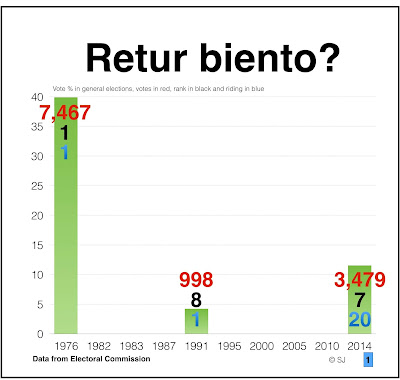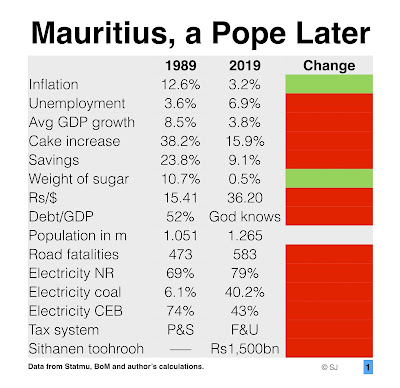Q1: Our parliament is too big. 5 reasons the LP/MMM alliance lost in 2014. Rekin dir non a simagri elektoral. Corporations should not fund political parties. TJC was set up against regressive backdrop. How Sweden became a safety champ. What makes Singapore wealthier than Japan. ICJ thinks UK should end occupation of Chagos. Piti depas papa.
Q2: Sithanen flat tax fuels more street protests. Voting on the roof of Europe begins. PJ against more women in parliament. Amritsar massacre turns 100. Fond du Sac learns compulsory acquisitions come in different flavours. For a vibrant democracy have these 5 ingredients. Perspective on flat tax damage. Tax policies should go in affidavits. Sithanen toohrooh could rise by Rs338bn by year-end. Norway bigger football powerhouse than Brazil.
Q3: Long wait over as Mauritius wins first IOIG. Pope to spend day with victim of trickle-down economics. Trees in Beau-Vallon have something in common with our saving culture. Toxic bean-counter self-praises himself. Why Bizlall should run in the general election? One Lord Mayor remembers another.
Q4: Did you enjoy Ramgoolam’s fourth term? Why dumping Gini coefficient is a good idea. Decomposing the 2014 defeat. Why Navin didn’t lose in 2010. Ramgoolam ena en nuvo palab. SSR has the best road-safety record. Intense cyclones didn’t destroy our resilience. Unproductive FDI doesn’t make up for collapse in savings. 10 narrowest general elections. Sugar has no future. Subron tries to fool us again. Who to vote for? Bérenger believes he’s the real miracle-man? God bless our FPTP system. Mauritius slides dangerously towards autocracy. Why SSR left a strong legacy. Fact-checking is oxygen of democracy. Let’s roll back drug use.
Q2: Sithanen flat tax fuels more street protests. Voting on the roof of Europe begins. PJ against more women in parliament. Amritsar massacre turns 100. Fond du Sac learns compulsory acquisitions come in different flavours. For a vibrant democracy have these 5 ingredients. Perspective on flat tax damage. Tax policies should go in affidavits. Sithanen toohrooh could rise by Rs338bn by year-end. Norway bigger football powerhouse than Brazil.
Q3: Long wait over as Mauritius wins first IOIG. Pope to spend day with victim of trickle-down economics. Trees in Beau-Vallon have something in common with our saving culture. Toxic bean-counter self-praises himself. Why Bizlall should run in the general election? One Lord Mayor remembers another.
Q4: Did you enjoy Ramgoolam’s fourth term? Why dumping Gini coefficient is a good idea. Decomposing the 2014 defeat. Why Navin didn’t lose in 2010. Ramgoolam ena en nuvo palab. SSR has the best road-safety record. Intense cyclones didn’t destroy our resilience. Unproductive FDI doesn’t make up for collapse in savings. 10 narrowest general elections. Sugar has no future. Subron tries to fool us again. Who to vote for? Bérenger believes he’s the real miracle-man? God bless our FPTP system. Mauritius slides dangerously towards autocracy. Why SSR left a strong legacy. Fact-checking is oxygen of democracy. Let’s roll back drug use.























